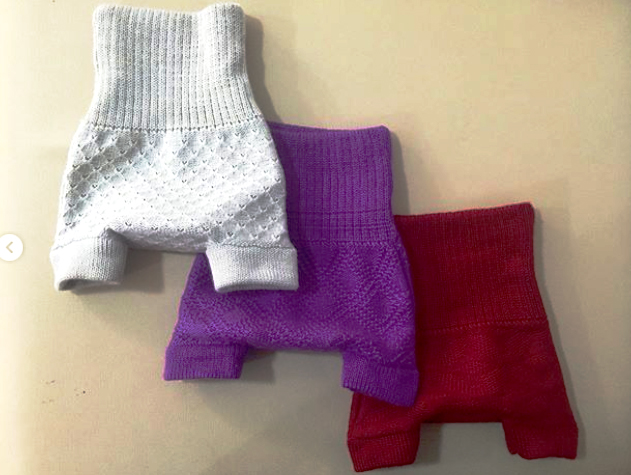ASTANA – Kazakh paediatric orthopaedist Roza Karabekova has invented panties for newborn babies (up to three months) to prevent hip joint dislocation. She emphasises early diagnosis of the disease, up to age one, prevents further gypsum and splinting treatments.
The knitted panties contain a small plastic element that prevents a child from bringing his or her legs together and helps to develop hip joints correctly. Karabekova devised them after her fifth child was born.
“In January 2009, I gave birth to my fifth child, a girl… As an orthopaedist, I noticed that she had crease asymmetry on her hips and a flick sound. I saw the symptoms of dysplasia… It is scientifically proven that treatment of dysplasia before one year gives good results. We just need to create the correct position of the lower limb – in the position of hip abduction. So, I knitted panties for her,” she said.
To create the position, she tried to put baby linen close to the perineal region, but it was inconvenient for the child, especially lying down, and also got wet.
“Once, I saw the boxing pants of my son that have a plastic piece inserted in them… Then, I thought why not to use this in the knitted panties, making a pocket for it,” said Karabekova.
She later decided to produce the panties to prevent children’s hip deformities.
“The implementation of this idea took a long time… In 2010, I got a two million tenge (US$5,290) grant from Astana Medical University. Using the funds from this grant… I travelled to study and for conferences and raised my professional qualifications. Then, I got a grant from the SANTO Company… of one million tenge (US$2,645),” she said.
After receiving the second grant, Karabekova travelled to other countries to study in her field.
“I went to Lithuania. There, every trauma orthopaedist’s office has an ultrasound machine. That is, the orthopaedist holds additional and early diagnostics of hip joints and the musculoskeletal system right away if necessary. It means that children go through mass screening. A child doesn’t have to be brought to an ultrasonographer additionally and the examination is held in one room,” she said.
In Kazakhstan, hip joint deformities are often diagnosed late. After age one, treatment is expensive and complicated, which triggered Karabekova to find new treatment methods.
“Right now, I’m writing a business plan… We are making modifications of the plastic bar. I ordered it from an orthopaedic plant, so it is safe for health and certified. One plastic bar costs 1,000 tenge (US$2.65). For example, we can make a package with panties, a blanket and a cap for a new mother. If there is dysplasia, then the mother puts the plastic bar inside the panties,” she said.
“In our leaflets, we always say that parents must visit an orthopaedist when a baby turns three months, because the panties do not cure everything… This is prophylaxis,” she noted.
A recent $1,350 grant from the Ambassadors Spouses Association is being put to good use.
“I made official applications to the Healthcare Department on Jan. 12. I will be working with clinics Nos. 4 and 10. Every Saturday from 3-6 p.m., I accept patients and give the panties for free. I have examined nine children for now and gave out three panties,” she added.
Karabekova is an Associate Professor in the Department of Paediatric Surgery at Astana Medical University and the founder of the Karabekov Public Fund named for her father, Agabek Karabekov, who was a paediatric orthopaedist, surgeon, professor and inventor.
The fund, which attracts volunteers to assist in its work, provides medical advisory and diagnostic help and organises children’s sports events, master classes for parents and children, conferences and student training at Astana Medical University.


